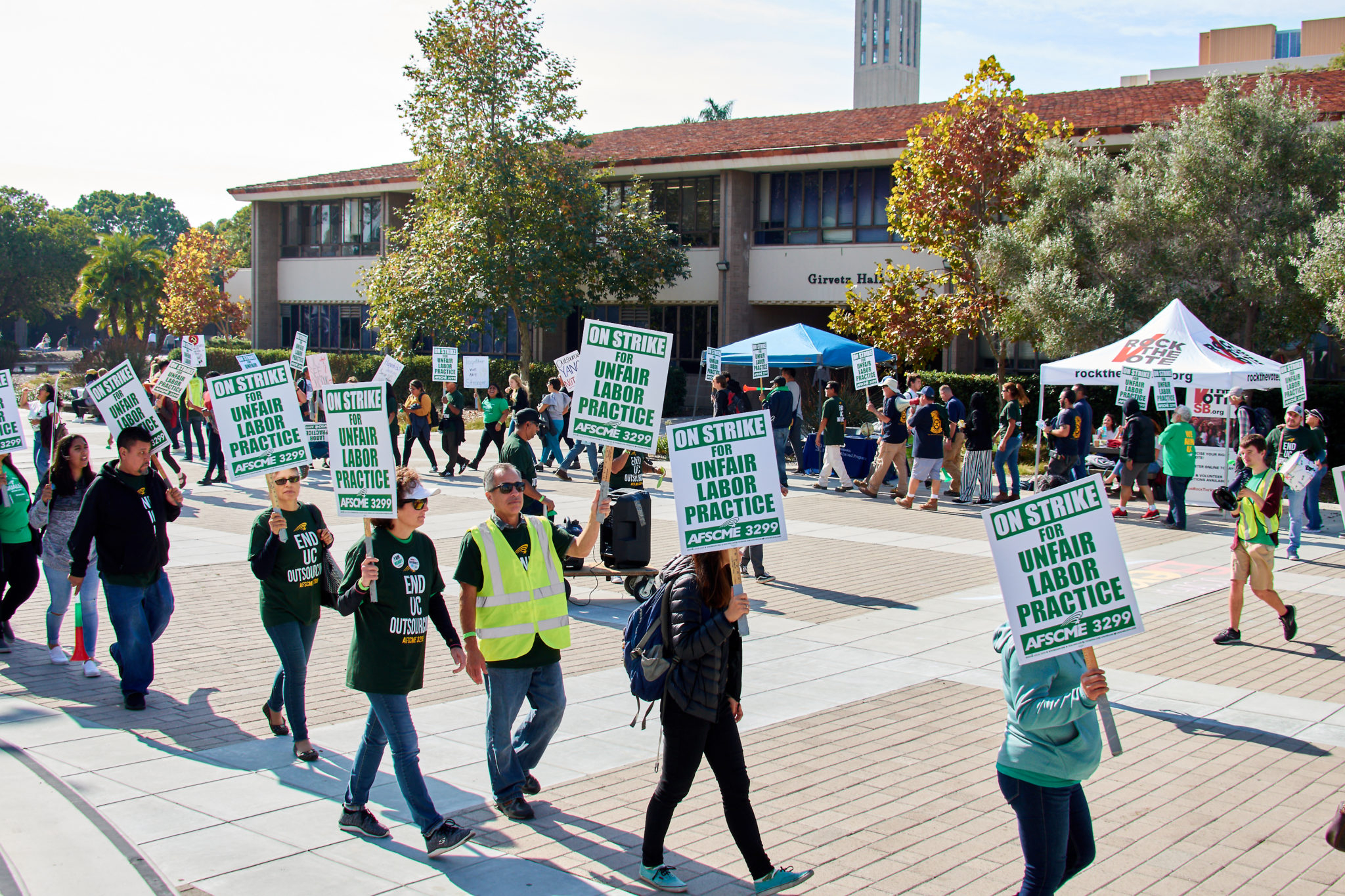CORRECTION [11/18/2025, 2:30 p.m.]: A previous version of this article stated that AFSCME is demanding a wage increase that guarantees a $25 minimum wage. It has been corrected to state that the UC has already implemented a $25 minimum wage in accordance with state law.
UPDATE [11/16/2025, 4:08 p.m.]: The UC and CNA announced on Nov. 16 that they reached a tentative contract deal and will no longer be striking as part of the agreement’s terms.
Two unions representing workers at the University of California will strike next week, from Nov. 17-18. Workers from both unions will be picketing at the UC Santa Barbara campus amid ongoing contract negotiations.

AFCSME is negotiating for wages that match the increasing cost of living, caps on healthcare costs and housing assistance, among other demands. Nexus File Photo
In total, roughly 86,000 workers across the University of California (UC) will be striking. The American Federation of State, Municipal and County Employees (AFSCME) 3299 and the California Nurses Association are both currently without a contract. Bargaining for AFSCME began in January 2024, with its contracts expiring later that year. In June, the UC offered its “last, best and final offer” to both patient care technical employees and service worker bargaining units.
The California Nurses Association’s contract expired in October. Negotiations between the union and the UC are underway, with the next negotiation session scheduled for Nov. 19-20.
On Nov. 10, AFSCME organizing intern and second-year sociology major Meadows Stevens hosted a meeting in preparation for the strike. According to the presentation, the union is negotiating for wages that match the increasing cost of living, caps on health care costs and housing assistance, among other demands.
According to Stevens, AFSCME has requested that people “not cross the picket line” and for students to boycott campus dining halls during the strike.
AFSCME 3299’s demands include a wage increase, which the union believes is necessary to keep up with nationwide inflationary trends. In July 2026, a $25 minimum wage will be implemented in accordance with state law. According to the United States Bureau of Labor Statistics (BLS), the Consumer Price Index — a measure of inflation for goods and services — has increased 3.3% in the last year in the Los Angeles area, as the BLS collects specific regional data.
One of AFSCME’s main concerns on this issue was the pay increases that UC executives, chancellors and presidents have received in recent years. In the 2024-25 school year, former Chancellor Henry T. Yang received a 24.2% pay raise in his final year as chancellor, from $579,750 to $820,000. Chancellor Dennis Assanis will receive a salary of $880,000, an approximate 7.32% increase from Yang’s salary in his final year.
Additionally, AFSCME’s demands include a $25,000 housing fund per employee that would be used for rent payments, mortgage assistance and home repairs. They are also demanding access to low-interest mortgage loans that would assist employees in the process to qualify to purchase a home, as well as a 20% down payment assistance that would be repaid when a home is sold.
According to Stevens, some UC workers cannot afford to live in the communities close to campuses, but UC administration has not provided AFSCME with “fair” terms because they claim they are unable to. Stevens also highlighted that UC is invested in Blackstone, an asset management firm.
The UC has invested around $6.5 billion in Blackstone, which includes a January 2023 $4 billion investment in the firm’s real estate investment trust, Blackstone Real Estate Income Trust (BREIT). According to a report from the Private Equity Stakeholder Project, Blackstone is the nation’s largest landlord and is actively contributing to housing unaffordability by hiking up rent costs for their properties.
According to the presentation, AFSCME workers are mainly women and people of color, with 50% identifying as Latino/a and 24% identifying as Asian American and Pacific Islander. 61% of the workers are women.
AFSCME stated on its website that its demands are about “fairness,” as they believe that the UC’s frontline workers are facing struggles, while “UC’s top executives flourish.”
The Nexus will continue strike coverage next week.
A version of this article appeared on p. 1 of the Nov. 13 print edition of the Daily Nexus.





















Has anyone been on strike or followed the labor negotiations at UC? I’m curious if measures like calling for a cafeteria boycott really create effective pressure.
Granny Game
Telecommunications connects people, businesses, and governments through seamless networks of communication. From mobile devices to internet systems, it plays a vital role in global connectivity and information exchange. Finding the best q link wireless phone number can help users access reliable services, ensuring efficient communication anywhere. With evolving technologies like 5G and fiber optics, telecommunications continues to enhance productivity, bridge distances, and support innovation across industries, shaping a more connected and accessible world for everyone.
One of AFSCME’s main on this issue was the pay increases that UC executives, chancellors and presidents have received in recent years. geometry dash 2
Иногда после тяжёлого дня мне хочется не просто отдохнуть, а переключиться на что-то, где всё зависит от моего мышления и решений. Именно поэтому я выбираю стратегии. В них нет суеты — есть расчёт, внимание к деталям и постепенное движение к цели. Мне нравится начинать с небольших ресурсов и шаг за шагом превращать их в мощную систему. Но настоящий интерес начинается тогда, когда можно обсудить свои подходы с другими игроками обговаривали игровые автоматы В этом плане для меня особое место занимает Strategium. Это форум, где стратегии рассматривают не поверхностно, а вдумчиво и глубоко. Там обсуждают нюансы баланса, сравнивают разные стили прохождения,… Read more »